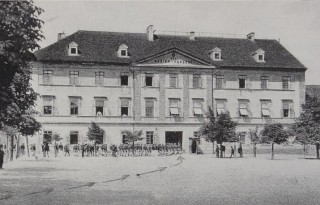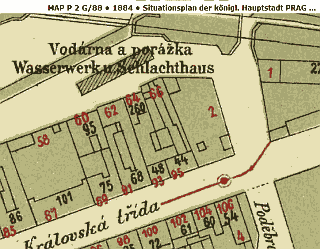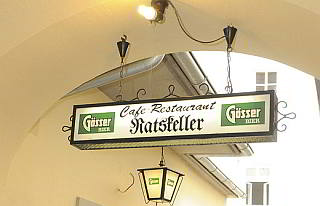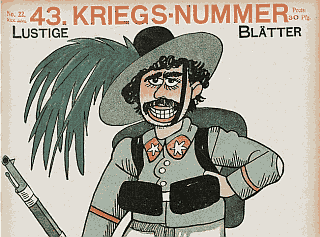
Mariánská kasárna in Budějovice (Budweis). Until 1 June 1915 it was the home of the Good Soldier Švejk's Infanterieregiment Nr. 91. In 1915 Jaroslav Hašek also served with the regiment in these barracks.
The novel The Good Soldier Švejk refers to a number of institutions and firms, public as well as private. On these pages they were until 15 September 2013 categorised as 'Places'. This only partly makes sense as this type of entity can not always be associated with fixed geographical points, in the way that for instance cities, mountains and rivers can. This new page contains military and civilian institutions (including army units, regiments etc.), organisations, hotels, public houses, newspapers and magazines.
The line between this page and "Places" is blurred, churches do for instance rarely change location, but are still included here. Therefore Prague and Vienna will still be found in the "Places" database, because these have constant coordinates. On the other hand institutions may change location: Odvodní komise and Bendlovka are not unequivocal geographical terms so they will from now on appear on this page.
The names are colour coded according to their role in the plot, illustrated by these examples: U kalicha as a location where the plot takes place, k.u.k. Kriegsministerium mentioned in the narrative, Pražské úřední listy as part of a dialogue, and Stoletá kavárna, mentioned in an anecdote.
 Institutions index of institutions, taverns, military units, societies, periodicals ... (286)
Show all
Institutions index of institutions, taverns, military units, societies, periodicals ... (286)
Show all I. In the rear
I. In the rear  14. Švejk as military servant to senior lieutenant Lukáš (14)
14. Švejk as military servant to senior lieutenant Lukáš (14) II. At the front
II. At the front  1. Švejk's mishaps on the train (15)
1. Švejk's mishaps on the train (15) 2. Švejk's budějovická anabasis (38)
2. Švejk's budějovická anabasis (38) 3. Švejk's happenings in Királyhida (44)
3. Švejk's happenings in Királyhida (44) 4. New afflictions (26)
4. New afflictions (26)



|
IV. The famous thrashing continued |
 | |
1. Švejk in the transport of russian prisoners of war | |||
 | Na Zavadilce |  | |||
| Karlín/68, Královská tř. 91 | |||||
| |||||

Na Zavadilce is mentioned in Švejk's comment to the conversation between Major Wolf and the captain where the formers conclusion is that Švejk is to be hanged after a summary trial. According to Švejk it was a pub in Libeň.
Background
Na Zavadilce has not been possible to identify with certainty. Any hospoda carrying this name doesn't seem to have existed in Libeň, but in Karlín there was a restaurant with this name. The location, Královská třída 91, isn't that far from Libeň, so it might be this one Švejk had in mind.
Quote(s) from the novel
[IV.1] Švejk, kterého vedli napřed a slyšel celý zajímavý rozhovor, neřekl nic jiného svým průvodčím než: „Pěšky jako za vozem. To jsme se vám jednou v hospodě ,Na Zavadilce’ v Libni hádali mezi sebou, jestli máme nějakýho kloboučníka Vašáka, kerej vždycky dělal při zábavě neplechu, vyhodit, hned jak se vobjeví ve dveřích, nebo ho vyhodit, až si dá pivo, zaplatí a dopije, nebo mu vyndat boty, až přetančí první kolo.
Literature
- Románové restaurační a jiné zábavní podniky2009 - 2021
 | Ratskeller |  | |||
| |||||

Ratskeller is the mentioned in the anecdote Švejk uses against the spy who enters his cell in Przemyśl.
Background
Ratskeller is a restaurant in Graz which is still in business. The address is Hauptplatz 17. The English translation of Cecil Parrott for some reason locates it to Steyr.
Quote(s) from the novel
[IV.1] Všechny lidi, který potkával na ulici, viděl buď na nádraží v Miláně, nebo s nimi seděl ve Štýrským Hradci v radničním sklepě při víně.
Also written:Townhall Cellar en
 | Lustige Blätter |  | |||
| Berlin/-, Markgrafenstraße 77 | |||||
| |||||

Lustige Blätter, 2.6.1915

Berliner Adreßbuch, 1915
Lustige Blätter is by the author mentioned as the publisher of some silly booklets that General Fink likes to quote from.
Background
Lustige Blätter was an illustrated humorous weekly that was published from 1886 to 1944. It was founded in Hamburg in 1886 by Alexander Moszkowski and Otto Eysler. The former was editor in chief until 1928 and in 1915 the publisher of the magazine was Verlag der "Lustigen Blätter" (Dr. Eysler & Co.) G.m.b.h.. Already in 1887 the editorial offices moved to Berlin.
Tornister-Humor series
From early 1915 they published a collection of patriotic booklets called Tornister-Humor, each of 64 pages. The author's description of the circumstances around the booklets is very accurate. In 1915 both Schloemp and Artur Lokesch contributed and Jaroslav Hašek correctly lists the names of some of the booklets the two were involved in[a]. He also mentions some subtitles but gives the impression that these were also full titles.
Quote(s) from the novel
[IV.1] Po všech instrukcích, které mu dával velitel garnisonní posádky, dával vždycky generál Fink něco ostrého nalít a potom mu vypravoval nejnovější anekdoty z nejblbějších svazečků, které pro vojsko byly vydány v „Lustige Blätter“. Měl celou knihovnu takových svazečků s pitomými názvy jako „Humor v tornistře pro oči i uši“, „Hindenburgovy anekdoty“, „Hindenburg v zrcadle humoru“, „Druhá tornistra plná humoru, naládovaná Felixem Schlemprem“, „Z našeho gulášového kanonu“, „Šťavnaté granátové třísky ze zákopů“, nebo tyto hovadiny: „Pod dvojitým orlem“, „Vídeňský řízek z c. k. polní kuchyně. Ohřál Artur Lokesch“. Někdy mu také předzpěvoval ze sbírky veselých vojenských písní „Wir müssen siegen!“, přičemž naléval neustále něco ostrého a nutil polního kuráta Martince, aby pil a hulákal s ním.
Sources: Antonín Měšťan
Literature
- Realien und Pseudorealien in Hašeks "Švejk"1983
- Lustige Blätter
- Tornister-Humor1.3.1916
- Alexander Moszkowski
| a | "Tornister-Humor" and 'The Good Soldier Švejk' | 10.5.2020 |



|
IV. The famous thrashing continued |
 | |
1. Švejk in the transport of russian prisoners of war | |||
| © 2008 - 2024 Jomar Hønsi | Last updated: 16.4.2024 |


